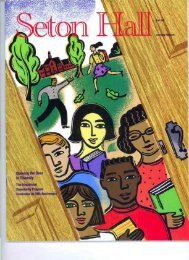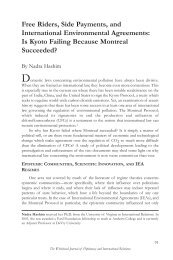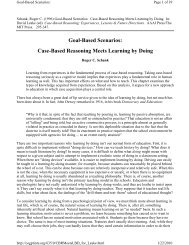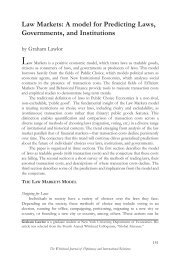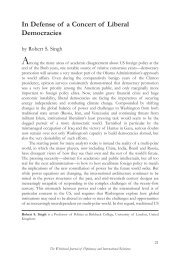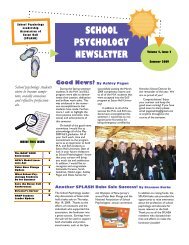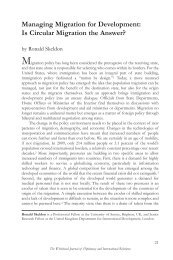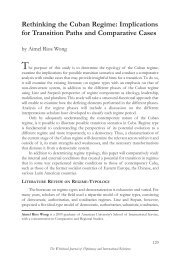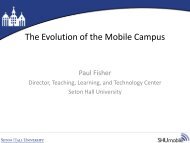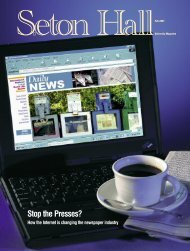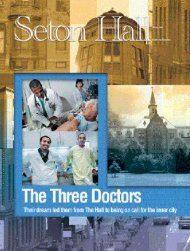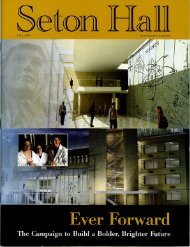Seton Hall Magazine, Winter 2000 - Seton Hall University
Seton Hall Magazine, Winter 2000 - Seton Hall University
Seton Hall Magazine, Winter 2000 - Seton Hall University
Create successful ePaper yourself
Turn your PDF publications into a flip-book with our unique Google optimized e-Paper software.
P o l i t i c s<br />
“We have a common sky. A common firmament<br />
encompasses us. What matters it by<br />
what kind of learned theory each man looketh<br />
for the truth? There is no one way that will<br />
take us to so mighty a secret.”<br />
Symmachus, on replacing the statue of<br />
victory in the Roman Forum, A.D. 384<br />
It is difficult to imagine a transition of<br />
similar magnitude to that described<br />
by Symmachus more than 1,500 years<br />
ago. Such paradigmatic shifts transform<br />
human reality and the arena within<br />
which we shape our world. As we turn<br />
toward the third millennium, what is our<br />
reality and how do we work within it?<br />
We live in a pluralistic society where<br />
competing interests vie for the right<br />
to exercise power. The founders were<br />
optimistic about this method of resolution.<br />
Granted our reality is considerably<br />
different from theirs — still it is<br />
difficult to imagine a better method of<br />
determining who gets what, when and<br />
how in a free society.<br />
If pluralism describes our reality, how<br />
do we work within it? A quick review<br />
of the 20th century shows myriad<br />
developments of political consciousness.<br />
Consider, for example, the rights<br />
of workers, women, children, and gay<br />
and lesbian men and women, and how<br />
these individuals acting in collectives<br />
pushed their way into the political arena.<br />
Take a moment to recall the Civil Rights<br />
movement, the pursuit of universal suffrage,<br />
even Prohibition or the work of<br />
the Moral Majority. I believe that the<br />
20th century will be remembered in<br />
many different ways, but it is also a time<br />
in our country where groups began to<br />
assert themselves without qualification.<br />
There has been considerable resistance,<br />
but healthy pluralism provides opportunities<br />
for the disenfranchised to find a<br />
voice and to demand that it be heard.<br />
Now, what comes of these seemingly<br />
uncompromising voices? The time has<br />
20 SETON HALL UNIVERSITY MAGAZINE<br />
E Pluribus Unum:<br />
Let Us Put Meaning into Pluralism<br />
BY W. KING MOTT, PH.D.<br />
come to put meaning into<br />
pluralism. We must reconsider our<br />
public conversation. No longer is it<br />
enough to acquire a voice or position at<br />
the table. As important as that is, it is<br />
more important, as any good host knows,<br />
to focus upon the details of the meal —<br />
the meaningful course here is the graciousness<br />
found in genuine conversation.<br />
What makes genuine conversation?<br />
Consider this: If I have no intention of<br />
changing anything about me when I<br />
speak with you, then we are not equals<br />
in dialogue. Genuine conversation<br />
involves conversion, and conversion happens<br />
in the context of considering our<br />
mutual advantage — the common good.<br />
So we come to what prevents us from<br />
discussing the common good: the fear<br />
that I may be wrong and the concurrent<br />
requirement of acknowledging that<br />
wrong and making reparation.<br />
Once converted to the common good,<br />
action and the idea of community are<br />
possible. Meanwhile, we cannot afford to<br />
idly comply with all that characterizes<br />
our world, or retreat into our high-rise<br />
apartments or gated suburban communities.<br />
To do so is sectarian and foolish.<br />
The notion that we should work for the<br />
common good is more than an abstraction<br />
with little immediate applicability.<br />
The truest test is our willingness to<br />
begin meaningful conversations within<br />
the family, the workplace and, perhaps<br />
most importantly, within our own hearts.<br />
Needless to say, conversation as conversion<br />
requires a radical departure from<br />
current practice, but if we desire something<br />
more than the politics of blame<br />
and denial, I see no other alternative and<br />
neither, I believe, does Yeats.<br />
The Spur<br />
W.B. Yeats<br />
You think it horrible that lust and rage<br />
Should dance attendance upon my old age;<br />
They were not such a plague when I was young;<br />
What else have I to spur me into song?<br />
W. King Mott, Ph.D. is dean<br />
of Freshman Studies and<br />
academic support services.<br />
BECKY HEAVNER



